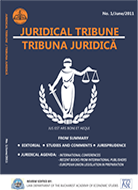Totalitarianisms and the establishment of objective legal order
Totalitarianisms and the establishment of objective legal order
Author(s): Dan Claudiu Dănişor, Mădălina-Cristina DănişorSubject(s): Constitutional Law, Human Rights and Humanitarian Law
Published by: Societatea de Stiinte Juridice si Administrative
Keywords: totalitarianism; nazism; communism; liberalism; legal order; legality; legitimacy; validity;
Summary/Abstract: The order of liberal political systems is the result of the dialectic between objective and subjective. It is based on the understanding of freedom as a formal, constitutive condition of society. Totalitarianism denies this dialectic, while altering at the same time the objective and the subjective meanings of order. This is why they cannot be valid legal orders, either in the objective sense, or in the subjective sense. The purpose of our study is to analyze the arguments that support the idea that the “concrete” orders of totalitarian regimes cannot be considered objective legal orders. The arguments are structured in four directions of analysis: 1. basing totalitarian order on legitimacy eliminates the need for legality; 2. totalitarian order is not a system of norms, but one of forces; 3. in totalitarian orders the distinction between norm and measure is no longer made; 4. the rules generated by totalitarian order are no longer the result of any institutionalization. The conclusion that emerges from these arguments is that in totalitarian systems objective law does not exist validly. If the Nazi and the communist languages still retain the term “law”, totalitarian thinking destroys the very concept of law.
Journal: Tribuna Juridică
- Issue Year: 10/2020
- Issue No: 21
- Page Range: 36-55
- Page Count: 20
- Language: English

